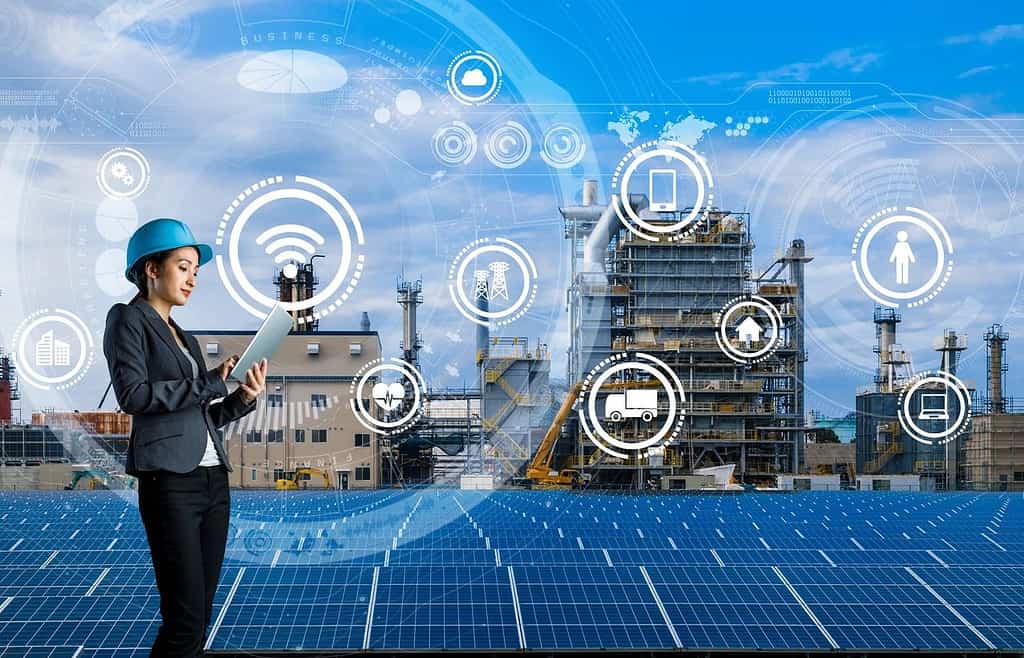The incredible and growing scale of the climate crisis – perhaps the biggest challenge faced by humanity today- has ignited a passion for innovation among companies worldwide. Thousands of startups have emerged in the last few years alone to work on new technologies and solutions designed to reduce carbon emissions, greenhouse gasses, and electronic waste.
Some organizations are working on making existing technologies more sustainable, while others are exploring new ways to generate electricity and power innovation. However, it’s not just inventors and startups that are playing a crucial role in the future of technology sustainability.
Existing business leaders and innovators are also doing their part. Whether it’s developing new initiatives and products, like Google’s Flex service, designed to modernize legacy devices, or simply implementing new ESG initiatives, countless leaders are proving sustainable tech is the future.
Here are just some of the leaders in the modern world with the most inspirational and powerful strategies for investing in sustainable technology today.

The Business Leaders Investing in Sustainable Tech
Notably, for this list, we’re not looking at the innovators transforming the landscape with new tech developments. Instead, we’re focusing on existing companies with massive global footprints, who have chosen to adopt sustainable tech strategies.
After all, paving the way for a future of sustainability requires every business to do its part. The good news is that investment in sustainable technology is growing. A Gartner survey from 2022 found 87% of organizations were already planning on increasing their investment in sustainability by the end of 2024. The study noted that the primary reasons cited for increased sustainability initiative were pressure from customers, investors, and regulators.
However, Gartner also noted that an investment in sustainability was a strategic move for many businesses too. Sustainability empowers businesses to cope with disruption – something we’re all facing a lot more of in the current world. 86% of companies in the survey said they believed becoming more sustainable would help to protect them, and their profits in the years ahead.
So, who are the biggest companies demonstrating the value of investing in sustainable tech? Here are some of our top picks for 2023.
1. Apple
Since 2015, Apple has consistently committed to reducing its carbon footprint, and minimizing emissions. In the company’s 2023 sustainability report, it outlined its recent success in making the Apple watch the first Apple product to be complete carbon neutral. The product is now powered 100% by clean, renewable electricity, and is made with over 30% recycled materials.
According to Apple, the innovations introduced with the updated Apple Watch mark the first step in the company’s strategy to make all of its products entirely carbon neutral by 2030. The brand aims to achieve its goals by investing in innovative materials, low-carbon shipping, and clean electricity. Plus, Apple is also investing in nature-based projects to offset any remaining carbon footprint.
To assist customers in making eco-friendly purchasing decisions, Apple will also be placing a new “neutral” logo on all of its products that are completely carbon neutral. On top of all of this innovation, Apple is also scaling up the use of recycled plastics across its products, and the company is also using 90% renewable electricity in all of its facilities.

2. Microsoft
Like Apple, Microsoft has lofty ambitions when it comes to ensuring sustainability. The company has its own dedicated CSR team, and aims to become completely “carbon negative” by 2030. Not only that, but by 2050, Microsoft hopes to have “removed” all of its historical emissions from the environment, through continued initiatives.
Also by 2030, Microsoft aims to be replenishing more water than it uses, and producing zero waste across its entire ecosystem. Even sooner than that, Microsoft will finish building a “Planetary computer” which will assist the company in protecting more land than it uses. Already, Microsoft has made incredible strides towards its goals.
It has increased water access to more than 1 million people, and protected over 12,270 acres of land. All the while, the company is investing in the development of sustainable technologies, to help improve access to sustainable energy, and enhance supply chain integrity.
3. Google
Similar to Apple and Microsoft, Google is investing heavily in sustainability, and sustainable technology. Google is pursuing net-zero emissions across its value chain and operations by 2030. This goal is supported by the company’s clean energy goal, which will allow it to operate data centers and office campuses entirely through carbon-free energy.
Google is also contributing to significant sustainable IT projects, like the Rødby Fjord solar project, which produces carbon-free energy to power the Google data center in Denmark. The company is even developing new tools, like solutions to help with greenhouse gas accounting.
From another perspective, Google is also producing products and solutions that help companies and individuals to become more eco-friendly. For instance, Nest thermostats help people to save energy and reduce emissions at home. Alternatively, the Google Flex program allows organizations to update legacy equipment with new operating systems, to reduce electronic waste.

4. Amazon
While Amazon might not seem like the most sustainable company in the world, due to the number of trucks it has on the roads, and the deliveries made by Amazon teams every day, it is making admirable progress towards a greener future.
Around 90% of the electricity consumed by Amazon in 2022 was attributed to renewable energy sources, and the company aims to reach 100% by 2025. The company is investing in new technology and product design to serve customers with a wider selection of sustainable products. They’re also providing companies and consumers with opportunities to repair, resell, and recycle their products.
AWS, the cloud computing, and technology branch of Amazon is also extremely impressive from a sustainability perspective. AWS infrastructure today is up to 5 times more energy efficient than most typical European data centers. AWS products, such as the Arm-based Graviton3-based Elastic Cloud Compute solutions, also use 60% less energy than comparable solutions.
5. Meta
Meta might have faced a number of controversies over the years for some of its initiatives, but it’s taking sustainability seriously. The company shares regular sustainability reports on its website, highlighting its goals and accomplishments for reducing emissions.
Since 2020, Meta has maintained net zero greenhouse gas emissions in all of its global operations. To achieve this, it reduced its operational emissions by 94% from 2017, supporting data centers and offices with entirely renewable energy. Meta is also working to decarbonize its footprint on a broader level, aiming to reach net zero emissions across its value chain by 2030.
In the last year, Meta has also returned 621 million gallons of water to regions facing high to medium levels of water stress, through restoration projects. Additionally, 100% of Meta’s operational data center buildings have achieved at least a LEED Gold certification.

6. Dell
Considered one of the top leaders investing in sustainable technology worldwide, Dell is partnering with suppliers to reduce greenhouse gas emissions by 60% in 2030. The company also aims to achieve net-zero greenhouse gas emissions by 2050.
Dell takes a multi-faceted approach to tech sustainability, starting with innovative design strategies. Dell is committed to reusing materials, and keeping products in circulation for longer through repair, recovery, and reuse practices. They also partnered with Intel to create “Concept Luna”; a prototype solution designed to make technology components more reusable.
What’s more, Dell is committed to ensuring over 50% of the materials in all of its products, and 100% of the packaging used for its items are made from recycled or renewable components by 2030. As an added bonus, Dell’s team is heavily invested in designing energy-efficiency processes that align with the latest eco label standards and certifications.
7. Cisco
Cisco believes optimizing your IT can go a long way towards ensuring you reach your sustainability goals in any business environment. The company has its own specific goals for minimizing carbon emissions and greenhouse gasses. For instance, Cisco plans to become a “net zero” company by 2040, across its value chain, by embracing hybrid work and accelerating the use of renewable energy.
Cisco is also investing heavily in sustainability-focused research, to help power the development of new technologies that can conserve resources and reduce waste. Cisco even provides companies with tools they can use to improve their own ESG and tech sustainability initiatives.
For instance, the Webex Control Hub allows companies to automate the switch-off of features like signage outside of your office hours, and offers insights into energy savings. Plus, Cisco offers the “Refresh” program, to minimize electronic waste, and the Cisco circular payment solution, which delivers a 5% incentive on the sustainable equipment purchased from the brand.

8. Intel
Intel has a host of impressive sustainability goals listed on its website. For instance, by 2030, the company wants to use 100% renewable electricity across its global operations, and achieve net positive water restoration. It also aims to reduce landfill waste by 60% by the same year.
Every year, Intel shares its sustainability achievements in its Corporate Responsibility reports. Plus, the company is working with stakeholders around the world to accelerate the application of technology to environments that will help to reduce climate impact worldwide.
As of 2022, Intel revealed it had saved 9.6 billion gallons of water, and was using 93% renewable electricity on a global scale. It also achieved a 67% increase in “upcycled” manufacturing waste, reducing the amount of electronic waste in landfills.
9. Samsung
On its website, Samsung notes its taking a “systematic” approach to sustainability, building eco-friendly processes into every product and technology experience. In the Samsung 2023 Sustainability report, the company has outlined a goal to reach net zero emissions by 2030 for its DX division.
The company also announced its new environmental strategy in 2022, which involves the increased used of renewable energy for its solutions and environments, as well as an updated approach to product development. For instance, Galaxy phones can now be returned to the Samsung company and upcycled for future products, to reduce electronic waste.
Certain Samsung products, like the SolarCell Remote, can now be charged using natural light or indoor lighting, instead of disposable batteries. Samsung is even using recycled fishing nets and other sources of recycled plastic for the production of smartphones, tablets, earbuds, and PCs.

10. IBM
Finally, like many companies today, IBM has set the lofty goal to achieve net-zero greenhouse gas emissions by 2030. The company’s ESG framework is extremely impressive. In 2022, the company made the commitment to include technology ethics education in training resources for all ecosystem partners, reaching more than 1,000 companies with guidelines and initiatives.
IBM also plans to deliver upskilling and development strategies to more than 30 million people by the end of 2030, providing training that will help them to reduce their environmental impact on a consistent basis. By 2025, IBM is also planning on diverting 90% of all of its non-hazardous waste from landfill to incineration.
On top of this, IBM regularly produces solutions, roadmaps, and technologies intended to help businesses upgrade their own environmental sustainability practices. For instance, companies can use the IBM Maximo application suite to track resource usage and reduce waste. IBM also offers a range of climate risk management, and ESG reporting tools.
The Leaders Investing in Sustainable Technology
This list covers only 10 of the most impressive companies investing in sustainable technology and environmentally friendly initiatives in today’s world. However, there are countless other notable brands worth mentioning, from HP and Intuit to Siemens and Autodesk.
If nothing else, this list serves as a powerful insight into the growing demand for sustainable initiatives, and eco-friendly technology in the modern world. Sustainability is no longer a nice-to-have concept in today’s age of climate crisis.
It’s time for every business, large and small to re-assess their approach to implementing, using, and managing technology, and make a meaningful change.



